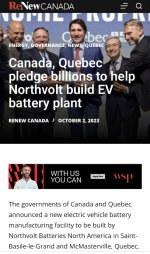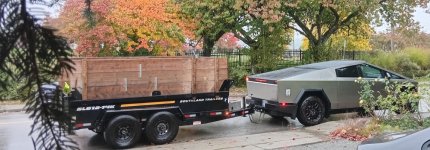sureThe EV charging stations with Diesel back up generators make perfect sense.
Electric shock: A new study found that EVs were more expensive to fuel than gas-powered cars at the end of 2022
- Thread starter petros
- Start date
You are using an out of date browser. It may not display this or other websites correctly.
You should upgrade or use an alternative browser.
You should upgrade or use an alternative browser.
The reason dealers might not be able to sell drivers the gas-powered cars they want is that the demand for electric vehicles is so low that selling too many gas-powered cars will cause dealers to miss their mandated electric vehicle sales targets.

 apple.news
Because this past June, just 7.9% of vehicles sold in Canada were zero-emission. That’s down 13% from June 2024, according to the Montreal Economic Institute and Statistics Canada. The Liberal government has mandated that 20% of all new cars sold in Canada next year must be electric or plug-in hybrid.
apple.news
Because this past June, just 7.9% of vehicles sold in Canada were zero-emission. That’s down 13% from June 2024, according to the Montreal Economic Institute and Statistics Canada. The Liberal government has mandated that 20% of all new cars sold in Canada next year must be electric or plug-in hybrid.
To get up from 8% to 20% this January, either Canadians are going to have to want electric vehicles much more than they seem to want them right now, or the number of new gas-powered cars being sold is going to have to be curtailed.
JAY GOLDBERG: Electric vehicle mandate speeding toward us and must be stopped — Toronto Sun
Imagine you’re at a car dealership next year. You’ve found the perfect new car you want to buy. It’s a gas guzzler, but it drives just the way you like — a match made in heaven. Now imagine you’re all ready to purchase the car, only to be told that you can’t buy the car because the dealership...
To get up from 8% to 20% this January, either Canadians are going to have to want electric vehicles much more than they seem to want them right now, or the number of new gas-powered cars being sold is going to have to be curtailed.
If I need a car, I will only consider a hybrid. Thankfully, I don't need a car right now & won't for the near future (fingers crossed).The reason dealers might not be able to sell drivers the gas-powered cars they want is that the demand for electric vehicles is so low that selling too many gas-powered cars will cause dealers to miss their mandated electric vehicle sales targets.
Because this past June, just 7.9% of vehicles sold in Canada were zero-emission. That’s down 13% from June 2024, according to the Montreal Economic Institute and Statistics Canada. The Liberal government has mandated that 20% of all new cars sold in Canada next year must be electric or plug-in hybrid.
JAY GOLDBERG: Electric vehicle mandate speeding toward us and must be stopped — Toronto Sun
Imagine you’re at a car dealership next year. You’ve found the perfect new car you want to buy. It’s a gas guzzler, but it drives just the way you like — a match made in heaven. Now imagine you’re all ready to purchase the car, only to be told that you can’t buy the car because the dealership...apple.news
To get up from 8% to 20% this January, either Canadians are going to have to want electric vehicles much more than they seem to want them right now, or the number of new gas-powered cars being sold is going to have to be curtailed.
Uh-oh!The news since the beginning of the month is that electric vehicle sales continue to soften, the cost of the global transition to alternate energy will be many trillions (yes, trillions) more than anyone has admitted and the measures implemented thus far, at great expense already, have had little impact on emissions or fossil fuel use, both of which are up in the past decade.
Uh-oh!At least in the western world, the “green” movement has basically been a parlour game by “progressive” elites funded at great cost by consumers and taxpayers (who are usually one and the same people.)
Not surprising, even a year ago, but also…uh-oh!Within the past two weeks, auto giant Ford has announced it’s converting a plant in Oakville from making EVs to producing oversized, internal-combustion pickup trucks because there is no market for the EVs and lots of demand for heavy duty trucks.
Uh-oh….?Quebec’s Lion Electric, which hopes to produce all-electric highway transports and buses, announced it was laying off 300 workers on top of the 220 it had laid off in February and April. Its shares are now in penny stock territory.
Uhm…uh-oh?Umicore, an EV battery maker, suspended construction of its $2.8-billion plant in eastern Ontario despite $1 billion in subsidies from Ottawa and Queen’s Park.
How Strategically strategic?And Northvolt, which last year announced a “possible” delay in the construction of its $3-billion plant in Quebec, announced in the last month that it was conducting a “strategic review” of its entire EV operations.
Well, that’s kind of a given. The non-wealthy have subsidized the wealthy, & now the subsidies…go away? The rest of us have to rely on our vehicles twelve months of the year….& have already been involved in purchasing several others EV’s, & funding battery plants, & a pissing tariff war with China who’s punishing Western Canada to fight against Ottawa protecting the EV auto/battery industry, etc…Now that wealthier consumers have purchased their EV toys and status symbols, middle-class buyers are not jumping into the pricier, less-reliable, inconvenient-to-charge EV market in the numbers government planners and environmentalists had predicted.


At a speech in Ottawa this week, Prime Minister Justin Trudeau insisted the $33 billion his government has spent on EV battery and car plants (along with $19 billion or $20 billion from Ontario and Quebec) was money well spent. It will ensure Canada is at the forefront of the coming EV boom.

Ugh…uh-oh? Wish we could’ve seen this coming in advance?
Then along came Janet Yellen, the U.S. treasury secretary. Speaking in Brazil, where she was sure to attract less media coverage, Yellen claimed the energy transition, which the Biden administration fully backs, will cost globally at least $4.1 trillion a year for the next 25 years. Cumulatively, that’s well over $100 trillion.

Uh-huh…yeah, that’s a big number.That’s 3% of worldwide production of all goods and services every year just for the transition to alternate energy. It’s a staggering number and one that is unlikely to be reached.

The announcement spells the end to Northvolt's highly touted, but controversial, plan to build a $7-billion plant in Saint-Basile-le-Grand and McMasterville in the Montérégie region. The Quebec government had supported the proposal and changed its own rules, allowing the project to bypass an environmental review.
Quebec had invested $510 million in the project, saying it would create 3,000 jobs in the area and make Quebec a battery producing powerhouse.
The investments included a $240-million guaranteed loan and a $270-million investment in Northvolt Batteries North America's parent company.
Quebec officially lost that $270-million investment, Fréchette said in a news release. Northvolt declared bankruptcy in Sweden in March. Fréchette insisted, however, that the province will recover the $240-million loan? Oh? Do tell!!
(Fréchette says the failure of the project does not spell the end for Quebec’s battery industry)
The government's recovery strategy focuses on several key elements to minimize the financial damage. First is the assertion of legal rights to maximize investment recovery through all available channels. The retention of a senior secured position on the acquired land provides some protection against total loss.
Another strategic element involves the reallocation of the significant power resources previously dedicated to Northvolt. The 352 megawatts of electrical capacity represents a valuable asset that can be deployed to support alternative industrial development.
Throughout their communications, government officials have acknowledged the project's failure while carefully highlighting recovery efforts, demonstrating an attempt to control the political narrative around this high-profile investment failure.

Quebec Government Ends £196 Million Northvolt Battery Plant Funding
Explore Quebec's decision to halt Northvolt battery project funding, its financial impact, and strategic consequences.

Quebec terminates Northvolt funding, wants to recover $510M
Quebec is pulling the plug on the Northvolt electric vehicle battery plant and will attempt to recover the $510 million it’s invested into the mega project. That’s what Quebec Minister of Economy and Energy Christine Fréchette announced Tuesday afternoon. A guaranteed loan of $240 million had...

Quebec ends funding for Northvolt battery factory - Montreal | Globalnews.ca
Economy Minister Christine Fréchette says the government made its decision after the company failed to produce an acceptable plan for Quebecers.

Well, they’ve still got that chunk of ground the factory was gonna be built on, & the trees are out of the way now, so…something can happen there. All that committed hydro-power is freed up so something else can get powered?
I’m thinking a rollerskate arena with 1000 disco-balls and scrolling coloured spotlights all powered by hydroelectric power, & the people of Montreal can commute back-and-forth to this on a high speed monorail that Alberta will pay for through the equalization program.
The EV day will probably come on its own, but hybrids first, and the switch to EV’s will happen organically when the technology catches up and the cost point comes down.Can't spell "evil" without "EV."
Not if conservatives have their way.The EV day will probably come on its own, but hybrids first, and the switch to EV’s will happen organically when the technology catches up and the cost point comes down.
Yeah. Two engines!I agree. Half breeds are the logical step.
Hey, works for cigarette boats.
Carney announced on Friday that Canada’s zero-emission vehicle sales mandate that was set to come into effect in 2026 will be delayed for a year while the government reviews the policy.
The mandate, which would have required at least 20 per cent of new vehicles sales in 2026 to be zero-emission vehicles, has attracted concerns from auto-makers in recent months. By 2035, the mandate would have required 100 per cent of new vehicle sales to be zero-emission.
Carney said the government would launch an immediate 60-day review of the policy “to reduce costs.”
Thursday, Finance Minister François-Philippe Champagne’s office told National Post work is underway for an upcoming review on whether the tariffs Canada applied to China’s electric vehicles, steel and aluminum should remain at the current rates.

 apple.news
apple.news
The mandate, which would have required at least 20 per cent of new vehicles sales in 2026 to be zero-emission vehicles, has attracted concerns from auto-makers in recent months. By 2035, the mandate would have required 100 per cent of new vehicle sales to be zero-emission.
Carney said the government would launch an immediate 60-day review of the policy “to reduce costs.”
Thursday, Finance Minister François-Philippe Champagne’s office told National Post work is underway for an upcoming review on whether the tariffs Canada applied to China’s electric vehicles, steel and aluminum should remain at the current rates.
Carney pauses electric vehicle mandate, announces new 'buy Canadian' policy — National Post
Carney's announcement comes amid a sluggish Canadian economy that shed 66,000 jobs in August
And yet they give start ups like Edison Motors shit fits because nothing makes sense.Carney announced on Friday that Canada’s zero-emission vehicle sales mandate that was set to come into effect in 2026 will be delayed for a year while the government reviews the policy.
The mandate, which would have required at least 20 per cent of new vehicles sales in 2026 to be zero-emission vehicles, has attracted concerns from auto-makers in recent months. By 2035, the mandate would have required 100 per cent of new vehicle sales to be zero-emission.
Carney said the government would launch an immediate 60-day review of the policy “to reduce costs.”
Thursday, Finance Minister François-Philippe Champagne’s office told National Post work is underway for an upcoming review on whether the tariffs Canada applied to China’s electric vehicles, steel and aluminum should remain at the current rates.

Carney pauses electric vehicle mandate, announces new 'buy Canadian' policy — National Post
Carney's announcement comes amid a sluggish Canadian economy that shed 66,000 jobs in Augustapple.news
Edison Motors is a Canadian startup specializing in plug-in hybrid electric semi-trucks, and they have been featured at the Everything Electric show. Their approach involves converting existing diesel heavy-duty trucks into hybrids that use a smaller diesel generator to charge a battery that powers electric drive motors.
Edison Motors: First BDE Come Together
Edison Hybrid trucks combine diesel and electric drives ...
Edison Motors to appear at global conference - Merritt Herald
Edison Hybrid trucks combine diesel and electric drives ...
What do you guys think of Edison Motors and their Diesel ...
Edison Motors' technology
Plug-in diesel-electric hybrid system: Edison's design uses a generator to power electric motors and charge batteries, similar to a locomotive. This allows the truck to have a smaller, more efficient diesel engine that can run at a constant RPM, rather than a large engine that needs to adapt to a variable load.
Retrofit strategy: The company focuses on remanufacturing and rebuilding older truck chassis rather than designing entirely new vehicles. This is intended to be a more practical and sustainable approach to electrification.
Targeted use case: The technology is particularly suited for heavy-duty applications like logging. In this use case, the truck can use regenerative braking to recharge its batteries while descending a mountain with a heavy load, and then use that stored power to climb back up.
Recent updates and challenges
"Everything Electric" appearances: Edison Motors has showcased its trucks at the Everything Electric Canada events, including in Vancouver in 2024 and 2025.
Regulatory hurdles: The company has faced challenges with Canadian regulations, specifically concerning the emissions certification of its hybrid system. Regulations currently differentiate between "on-highway" (truck) and "off-highway" (generator) emissions tiers, creating a barrier for hybrid vehicles that use a generator.
Political engagement: Edison Motors has met with British Columbia MLAs and has published videos discussing the regulatory challenges it faces. The company hopes for more transparent government support for its innovative approach.
Active logging: Despite regulatory issues, the company's 2024 update at Everything Electric revealed that its prototype logging truck was fully operational and hauling logs in British Columbia.
The "Everything Electric" show
Everything Electric is an event series, produced by the creators of the Fully Charged show, that highlights developments in electrification. Edison Motors' hybrid heavy-duty truck is a fitting example of the kind of innovative vehicle showcased at the event.
That's exactly what will happen under the conservatives. They have common sense; the Libs have none. They prefer the "fox in the henhouse" approach which is moronic but then that's the Libs for yuh!Not if conservatives have their way.
Yup. Cuz they're EEE-vil CommieNaziFagTards who want to D'STROY CANADUH!That's exactly what will happen under the conservatives. They have common sense; the Libs have none. They prefer the "fox in the henhouse" approach which is moronic but then that's the Libs for yuh!

Electric car pay per mile tax incoming? Rachel Reeves under pressure to do it...
Rachel Reeves, the Chancellor of the Exchequer, is facing calls to introduce a pay-per-mile tax system in the upcoming Autumn Budget, as experts warn of a lo...
I knew the road tax was going to hit sooner or later. EVs are heavy as fuck and hard on thin membrane roads.
L

Electric car pay per mile tax incoming? Rachel Reeves under pressure to do it...
Rachel Reeves, the Chancellor of the Exchequer, is facing calls to introduce a pay-per-mile tax system in the upcoming Autumn Budget, as experts warn of a lo...youtube.com
I knew the road tax was going to hit sooner or later. EVs are heavy as fuck and hard on thin membrane roads.
Was there any doubt ?
Electric car pay per mile tax incoming? Rachel Reeves under pressure to do it...
Rachel Reeves, the Chancellor of the Exchequer, is facing calls to introduce a pay-per-mile tax system in the upcoming Autumn Budget, as experts warn of a lo...youtube.com
I knew the road tax was going to hit sooner or later. EVs are heavy as fuck and hard on thin membrane roads.
There is nothing about that monstrosity that looks right regardless what it is doing.
Sorry, but that truck is ugly!! We have one here locally & every time I see it, I want to barf!!

